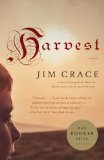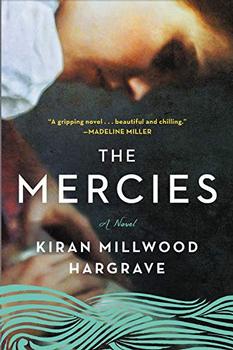Summary | Excerpt | Reviews | Beyond the book | Read-Alikes | Genres & Themes | Author Bio

In effortless, expertly crafted prose, Jim Crace details the unraveling of bucolic life in the face of economic progress. His tale is timeless and unsettling, evoking a richly textured world you will remember long after you finish reading.
A remote English village wakes on the morning after harvest, looking forward to enjoying a hard-earned day of rest and feasting. But two mysterious columns of smoke mar the sky, raising alarm and suspicion.
The first column of smoke comes from the edge of the village land, sent as a signal by newcomers to announce their presence as per regional custom. The second smoke column is even more troubling: it comes from a blaze set in Master Kent's stables. Walter Thirsk, a relative outsider in the village, casts his eye on three local boys and blames their careless tomfoolery. The rest of the villagers, though, close ranks against the strangers rather than accuse one of their own. Two men and a woman are apprehended; their heads are shaved to mark their criminality; and the men are thrown into the stocks for a week. Justice has been served. Or has it?
Meanwhile, another newcomer has been spotted in the village sporting the finer clothes and fashionable beard of a townsman. Mr. Quill, as the villagers name him, observes them closely and takes careful notes about their land, apparently at Master Kent's behest. It is his presence more than any other that will threaten the village's entire way of life.
In effortless, expertly crafted prose, Jim Crace details the unraveling of bucolic life in the face of economic progress. His tale is timeless and unsettling, evoking a richly textured world you will remember long after you finish reading.
Jim Crace's writing is sensual with an impressionistic feel, in the sense that cause and effect are often seen through a prism and you get a full picture of the story only when you stand back and take it all in its entirety. We know the time period is significant, a little research revealing the disastrous effects resulting from the virtual overnight growth of the wool trade. The enclosure of formerly common land causes many to go hungry, and the gulf between rich and poor grows ever wider, inviting economic disaster. But in Harvest, none of this is expressly said. Crace merely portrays the feelings, the vertiginous madness of a society coming apart at the seams which, as he explained to me, is a story that is still being repeated today - with small farmers all over the world being forced from their land...continued
Full Review
(791 words)
This review is available to non-members for a limited time. For full access,
become a member today.
(Reviewed by Lisa Guidarini).
 Harvest seems to be set in an era when English society is evolving from use of land to grow crops to enclosed pastures for animals. What about this specific time period did you find compelling as a setting for your novel? Could it have been set in any other time and place?
Harvest seems to be set in an era when English society is evolving from use of land to grow crops to enclosed pastures for animals. What about this specific time period did you find compelling as a setting for your novel? Could it have been set in any other time and place?
The time period isn't all that specific, in fact. I wasn't trying to write a novel that was medieval or Tudor or Jacobean. If the novel has a "setting" at all then it's Shakespeare's England. So it's prose fiction based on stage fiction. But, if the exact time and location of the story are not important to me, the subject matters are. And the subject matters are timeless. Small farmers all over the world are still being forced from their land, edged out by timber ...
This "beyond the book" feature is available to non-members for a limited time. Join today for full access.

If you liked Harvest, try these:

by Kiran Millwood Hargrave
Published 2021
After the men in an Arctic Norwegian town are wiped out, the women must survive a sinister threat in this "perfectly told" 1600s parable of "a world gone mad" (Adriana Trigiani).

by Conn Iggulden
Published 2019
From New York Times bestselling Conn Iggulden comes a new novel set in the red-blooded days of Anglo-Saxon England. This is the original game for the English throne.
It is among the commonplaces of education that we often first cut off the living root and then try to replace its ...
Click Here to find out who said this, as well as discovering other famous literary quotes!